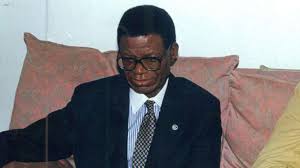Professor Ernest Wamba dia Wamba (1942–2020) was a distinguished Congolese philosopher, political theorist, and activist renowned for his contributions to African democracy and philosophy. Born in the Democratic Republic of Congo (DRC), he pursued higher education in the United States, earning degrees from Western Michigan University and the Claremont Colleges. During his time in the U.S., he actively participated in the civil rights movement, advocating for racial equality. citeturn0search2
In the 1980s, Professor Wamba returned to Africa, joining the University of Dar es Salaam in Tanzania as a history professor. There, he became a central figure in the Dar es Salaam School of Social Research, fostering Pan-Africanism and engaging with numerous African intellectuals. citeturn0search2 His academic work emphasized indigenous African democratic practices, notably the “communal palaver,” a traditional method of communal decision-making and conflict resolution. citeturn0search5
Politically, Professor Wamba played a significant role in the DRC’s transition to democracy. He served as a senator and was vice president of the Senate’s Permanent Commission on Legal and Administrative Matters during the transitional government. Additionally, he led the Rally for Congolese Democracy during the Second Congo War in the 1990s, advocating for democratic reforms and national reconciliation. citeturn0search4
In recognition of his scholarly and developmental contributions, Professor Wamba was honored with the Prince Claus Award in 1997. citeturn0search0 He also presided over the Council for the Development of Social Science Research in Africa (CODESRIA) from 1992 to 1995, furthering academic discourse on the continent. citeturn0search4
Professor Wamba’s legacy as a scholar, activist, and advocate for African unity and democracy continues to inspire and influence contemporary discussions on governance, societal development, and Pan-Africanism.

